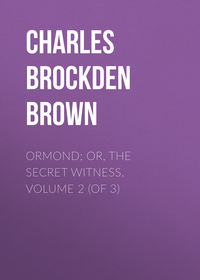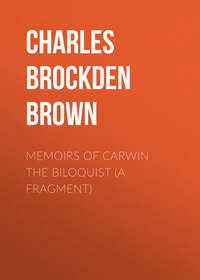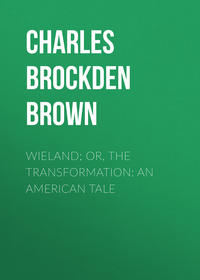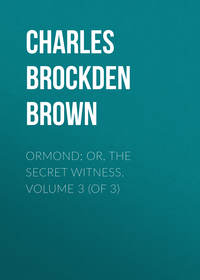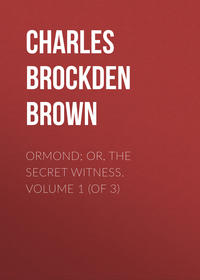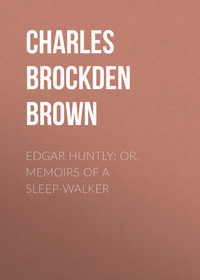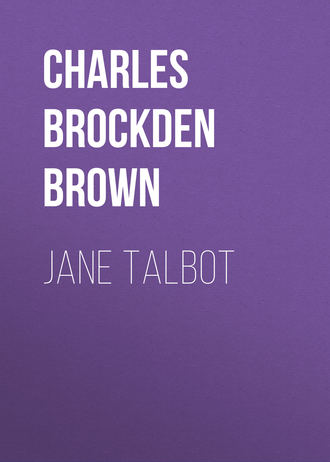 полная версия
полная версияJane Talbot
"Then, pray, sir, on what are built your pretensions to my sister?"
"Really, sir, they are built on nothing. I am, in every respect, immeasurably her inferior. I possess not a single merit that entitles me to grace from her."
"I have surely not been misinformed. She tacitly admitted that she was engaged to be your wife."
"'Tis very true. She is so."
"But what, then, is the basis of this engagement?"
"Mutual affection, I believe, is the only basis. Nobody who knows Jane Talbot will need to ask why she is beloved. Why she requites that passion in the present case, is a question which she only can answer."
"Her passion, sir," (contemptuously,) "is the freak of a child; of folly and caprice. By your own confession you are beggarly and worthless, and therefore it becomes you to relinquish your claim."
"I have no claim to relinquish. I have urged no claims. On the contrary, I have fully disclosed to her every folly and vice that cleaves to my character."
"You know, sir, what I mean."
"I am afraid not perfectly. If you mean that I should profess myself unworthy of your sister's favour, 'tis done. It has been done a hundred times."
"My meaning, sir, is simply this: that you, from this moment, give up every expectation of being the husband of Mrs. Talbot. That you return to her every letter and paper that has passed between you; that you drop all intercourse and correspondence."
I was obliged to stifle a laugh which this whimsical proposal excited. I continued, through this whole dialogue, to regard my companion with a steadfast and cheerful gravity.
"These are injunctions," said I, "that will hardly meet with compliance, unless, indeed, they were imposed by the lady herself. I shall always have a supreme regard for her happiness; and whatever path she points out to me, I will walk in it."
"But this is the path in which her true interest requires you to walk."
"I have not yet discovered that to be her opinion; the moment I do, I will walk in it accordingly."
"No matter what her opinion is. She is froward and obstinate. It is my opinion that her true happiness requires all connection between you to cease from this moment."
"After all, sir, though, where judgments differ, one only can be right, yet each person must be permitted to follow his own. You would hardly, I imagine, allow your sister to prescribe to you in your marriage choice, and I fear she will lay claim to the same independence for herself. If you can convert her to your way of thinking, it is well. I solemnly engage to do whatever she directs."
"This is insolence. You trifle with me. You pretend to misconstrue my meaning."
"When you charge me with insolence, I think you afford pretty strong proof that you mistake my meaning. I have not the least intention to offend you."
"Let me be explicit with you. Do you instantly and absolutely resign all pretensions to my sister?"
"I will endeavour to be explicit in my turn. Your sister, notwithstanding my defects and disadvantages, offers me her love, vows to be mine. I accept her love; she is mine; nor need we to discuss the matter any further."
This, however, by no means put an end to altercation. I told him I was willing to hear all that he had to say upon the subject. If truth were on his side, it was possible he might reason me into a concurrence with him. In compliance with this concession, he dwelt on the benefits which his sister would receive from accompanying him to France, and the mutual sorrow, debasement, and perplexity likely to flow from a union between us, unsanctioned by the approbation of our common friends.
"The purpose of all this is to prove," said I, "that affluence and dignity without me will be more conducive to your sister's happiness than obscurity and indigence with me."
It was.
"Happiness is mere matter of opinion; perhaps Jane thinks already as you do."
He allowed that he had talked with you ineffectually on that subject.
"I think myself bound to believe her in a case where she is the proper judge, and shall eagerly consent to make her happy in her own way. That, sir, is my decision."
I will not repeat the rest of our conversation. Your letters have given me some knowledge of your brother, and I endeavoured by the mildness, sedateness, and firmness of my carriage to elude those extremes to which his domineering passions were likely to carry him. I carefully avoided every thing that tended in the least to exasperate. He was prone enough to rage, but I quietly submitted to all that he could say. I was sincerely rejoiced when the conference came to an end.
Whence came your brother thus abruptly? Have you seen him? Yet he told me that you had. Alas! what must you have suffered from his impetuosity!
I look with impatience for your next letter, in which you will tell what has happened.
Letter XXXIII
To Henry ColdenPhiladelphia, November 17.
I have just sent you a letter, but my restless spirit can find no relief but in writing.
I torment myself without end in imagining what took place at your meeting with my brother. I rely upon your equanimity; yet to what an insupportable test will my brother's passions subject you! In how many ways have I been the cause of pain and humiliation to you! Heaven, I hope, will some time grant me the power to compensate yon for all that I have culpably or innocently made you suffer.
What's this? A letter from my brother! The superscription is his.
Let me hasten, my friend, to give you a copy of this strange epistle. It has neither date nor signature.
"I have talked with the man whom you have chosen to play the fool with. I find him worthy of his mistress; a tame, coward-hearted, infatuated blockhead.
"It was silly to imagine that any arguments would have weight with you or with him. I have got my journey for my pains. Fain would I have believed that you were worthy of a different situation; but I dismiss that belief, and shall henceforth leave you to pursue your own dirty road, without interruption.
"Had you opened your eyes to your true interest, I think I could have made something of you. My wealth and my influence should not have been spared in placing you in a station worthy of my sister. Every one, however, must take his own way,–though it lead him into a slough or a ditch.
"I intended to have virtually divided my fortune with you; to have raised you to princely grandeur. But no; you are enamoured of the dirt, and may cling to it as closely as you please.
"It is but justice, however, to pay what I owe you. I remember I borrowed several sums of you; the whole amounted to fifteen hundred dollars. There they are, and much good may they do you. That sum and the remnant which I left you may perhaps set the good man up in a village shop,–may purchase an assortment of tapes, porringers, and twelve-to-the-pound candles. The gleanings of the year may find you in skimmed milk and hasty pudding three times a day, and you may enjoy between whiles the delectable amusements of mending your husband's stockings at one time, and serving a neighbour with a pennyworth of snuff at another.
"Fare thee well, Jane. Farewell forever; for it must be a stronger inducement than can possibly happen, that shall ever bring me back to this land. I would see you ere I go, but we shall only scold; so, once more, farewell, simpleton."
What think you of this letter? The enclosed bills were most unexpected and acceptable presents. I am now twice as rich as I was. This visit of my brother I was disposed to regret, but on the whole I ought, I think, to regard it with satisfaction. By thus completely repairing the breach made in my little patrimony, it has placed me in as good a situation as I ever hoped to enjoy; besides, it has removed from my brother's character some of the stains which used to discolour it. Ought I not to believe him sincere in his wishes to do me service? We cannot agree exactly in our notion of duty or happiness, but that difference takes not away from him the merit of a generous intention. He would have done me good in his way.
Methinks I am sorry he is gone. I would fain have parted with him as a sister ought. A few tears and a few blessings were not unworthy such an occasion. Most fervently should I have poured my blessings upon him. I wish he had indulged me with another visit; especially as we were to part, it seems, forever. One more visit and a kind embrace from my only brother would have been kept in melancholy, sweet remembrance.
Perhaps we shall meet again. Perhaps, some day, thou and I shall go to France. We will visit him together, and witness, with our own eyes, his good fortune. Time may make him gentle, kind, considerate, brotherly. Time has effected greater wonders than that; for I will always maintain that my brother has a noble nature: stifled and obscured it may be, but not extinguished.
Letter XXXIV
To Henry ColdenPhiladelphia, November 18.
How little is the equanimity or patience that nature has allotted me! Thy entrance now would find me quite peevish. Yet I do not fear thy entrance. Always anxious as I am to be amiable in your eyes, I am at no pains to conceal from you that impatience which now vexes my soul, because it is your absence that occasions it.
I sat alone on the sofa below, for a whole hour. Not once was the bell rung; not once did my fluttering heart answer to footsteps in the passage. I had no need to start up at the opening of the parlour-door, and to greet, as distinctly as the joyous tumult of my bosom would suffer me, the much-loved, long-expected visitant.
Yet, deceived by my fond heart into momentary forgetfulness of the interval of a hundred miles that lies between us, more than once I cast a glance behind me, and started, as if the hoped-for peal had actually been rung.
Tired, at length, of my solitude, where I had enjoyed your company so often, I covered up the coals and withdrew to my chamber. "And here," said I, "though I cannot talk to him, yet I can write."
But first, I read over again this cruel letter of my mother. I weighed all the contents, and especially those heavy charges against you.
How does it fall out that the same object is viewed by two observers with such opposite sensations? That what one hates, the other should dote upon?–two of the same sex; one cherished from infancy, reared, modelled, taught to think, feel, and even to speak, by the other: acting till now, and even now acting in all respects but one, in inviolable harmony; that two such should jar and thwart each other, in a point, too, in respect to which the whole tendency and scope of the daughter's education was to produce a fellow-feeling with the mother. How hard to be accounted for! how deeply to be rued!
I sometimes catch myself trembling with solicitude lest I should have erred. Am I not betrayed by passion? can I claim the respect due to that discernment which I once boasted?
I cannot blame my mother. She acts and determines, as I sometimes believe, without the benefits of my knowledge. Did she know as much as I know, surely she would think as I do.
In general, this conclusion seems to be just; but there are moments when doubts insinuate themselves. I cannot help remembering the time when I reasoned like my mother; when the belief of a Christian seemed essential to every human excellence. All qualities, without that belief, were not to be despised as useless, but to be abhorred as pernicious. There would be no virtue, no merit, divorced from religion. In proportion to the speciousness of his qualities was he to be dreaded. The fruit, whatever form it should assume, was nothing within but bane, and was to be detested and shunned in proportion as the form was fair and its promises delicious.
I seldom trusted myself to inquire how it was my duty to act towards one whom I loved, but who was destitute of this grace; for of such moment was the question to me, that I imagined the decision would necessarily precede all others. I could not love till I had investigated this point, and no force could oblige me to hold communion with a soul whom this defect despoiled of all beauty and devoted to perdition.
But what now is the change that time and passion have wrought! I have found a man without religion. What I supposed impossible has happened. I love the man. I cannot give him up. The mist that is before my eyes does not change what was once vice into virtue. I do not cease to regard unbelief as the blackest stain, as the most deplorable calamity that can befall a human creature; but still I love the man, and that fills me with unconquerable zeal to rescue him from this calamity.
But my mother interferes. She reminds me of the horror which I once entertained for men of your tenets. She enjoins me to hate you, or to abhor myself for loving one worthy of nothing but hatred.
I cannot do either. My heart is still yours, and it is a voluntary captive. I would not free it from its thraldom, if I could. Neither do I think its captivity dishonours it. Time, therefore, has wrought some change. I can now discover some merit, something to revere and to love, even in a man without religion. I find my whole soul penetrated with zeal for his welfare. There is no scheme which I muse upon with half the constancy or pleasure, as that of curing his errors; and I am confident of curing them.
"Ah, Jane," says my mother; "rash and presumptuous girl, what a signal punishment hangs over thee! Thou wilt trust thyself within the toils of the grand deceiver. Thou wilt enter the list with his subtleties. Vain and arrogant, thou fearest not thy own weakness. Thou wilt stake thy eternal lot upon thy triumph in argument against one who, in spite of all his candour and humility, has his pride and his passions engaged on the side of his opinions.
"Subtle wretch!" does she exclaim; "accomplished villain! How nicely does he select, how adroitly manage, his tools! He will oppose, only to yield more gracefully. He will argue, only that the rash simpleton may the more congratulate herself upon her seeming victory! How easy is the verbal assent,–the equivocating accent,–the hesitating air! These he will assume whenever it is convenient to lull your fears and gratify your vanity; and nothing but the uniformity of his conduct, his continuance in the same ignominious and criminal path, will open your eyes, and show you that only grace from above can reach his obdurate heart, or dart a ray into his benighted faculties."
Will you be surprised that I shudder when my mother urges me in this strain, with her customary energy? Always wont to be obsequious to the very turn of her eye, and to make her will not only the regulator of my actions, but the criterion of my understanding, it is impossible not to hesitate, to review all that has passed between us, and reconsider anew the motives that have made me act as I have acted.
Yet the review always confirms me in my first opinion. You err, but are not obstinate in error. If your opinions be adverse to religion, your affections are not wholly estranged from it. Your understanding dissents, but your heart is not yet persuaded to refuse. You have powers, irresistible in whatever direction they are bent; capable of giving the highest degree of misery or happiness to yourself and to others. At present they are misdirected or inactive; they are either pernicious or useless.
How can I, who have had ample opportunities of knowing you, stand by with indifference while such is your state? I love you, it is true. All your felicity and all your woe become mine. I have a selfish interest in your welfare. I cannot bear the thought of passing through this world, or of entering any future world, without you. My heart has tried in vain to create a separate interest, to draw consolation from a different source. Hence indifference to your welfare is impossible. But would not indifference, even if no extraordinary tie subsisted between us, be criminal? What becomes of our obligation to do good to others, if we do not exert ourselves, when all the means are in our power, to confer the most valuable of all benefits, to remove the greatest of all ills?
Of what stuff must that heart be made which can behold, unmoved, genius and worth, destitute of the joys and energies of religion; wandering in a maze of passions and doubts; devoured by fantastic repinings and vague regrets; drearily conscious of wanting a foundation whereon to repose, a guide in whom to trust? What heart can gaze at such a spectacle without unspeakable compassion?
Not to have our pity and our zeal awakened seems to me to argue the utmost depravity of heart. No stronger proof can be given that we ourselves are destitute of true religion. The faith or the practice must be totally wanting. We may talk devoutly; we may hie, in due season, to the house of prayer; while there, we may put on solemn visages and mutter holy names. We may abstain from profane amusements or unauthorized words; we may shun, as infections, the company of unbelievers. We may study homilies and creeds; but all this, without rational activity for others' good, is not religion. I see, in all this, nothing that I am accustomed to call by that name.
I see nothing but a narrow selfishness; sentiments of fear degrading to the Deity; a bigotry that contracts the view, that freezes the heart, that shuts up the avenues to benevolent and generous feeling. This buckram stiffness does not suit me. Out upon such monastic parade! I will have none of it.
But then, it seems, there is danger to ourselves from such attempts. In trying to save another from drowning, may we not sometimes be drawn in ourselves? Are we not taught to deprecate, not only evil, but temptation to evil?
What madness, to trust our convictions, in a point of such immense importance, to the contest of argument with one of superior subtlety and knowledge! Is there not presumption in such a trust?
Excellent advice is this to the mass of women; to those to whom habit or childish fear or parental authority has given their faith; who never doubted or inquired or reasoned for themselves. How easily is such a fabric to be overturned! It can only stand by being never blown upon. The least breath disperses it in air; the first tide washes it away.
Now, I entertain no reverence for such a bubble. In some sense, the religion of the timorous and uninquisitive is true. In another sense it is false. Considering the proofs on which it reposes, it is false, since it merely originates in deference to the opinions of others, wrought into belief by means of habit. It is on a level, as to the proof which supports it, with the wildest dreams of savage superstition, or the fumes of a dervise's fanaticism.
As to me, I was once just such a pretty fool in this respect as the rest of my sex. I was easily taught to regard religion not only as the safeguard of every virtue, but even as the test of a good understanding. The name of infidel was never mentioned but with abhorrence or contempt. None but a profligate, a sensualist, a ruffian, could disbelieve. Unbelief was a mere suggestion of the grand deceiver, to palliate or reconcile us to the unlimited indulgence of our appetites and the breach of every moral duty. Hence it was never steadfast or sincere. An adverse fortune or a death-bed usually put an end to the illusion.
Thus I grew up, never beset by any doubts, never venturing on inquiry. My knowledge of you put an end to this state of superstitious ignorance. In you I found, not one that disbelieved, but one that doubted. In all your demeanour there was simplicity and frankness. You concealed not your sentiments; you obtruded them not upon my hearing. When called upon to state the history of your opinions, it was candidly detailed; with no view of gaining my concurrence, but merely to gratify my curiosity.
From my remonstrances you never averted your ear. Every proof of an unprejudiced attention, and even of a bias favourable to my opinions, was manifest. Your own experience had half converted you already. Your good sense was for a time the sport of a specious theory. You became the ardent and bold champion of what you deemed truth. But a closer and longer view insensibly detected flaws and discords where all had formerly been glossy smoothness and ravishing harmony. Diffidence and caution, worthy of your youth and inexperience, had resumed their place; and those errors of which your own experience of their consequences had furnished the antidote, which your own reflections had partly divested of illusion, had only been propitious to your advancement in true wisdom.
What had I to fear from such an adversary? What might I not hope from perseverance? What expect but new clearness to my own convictions, new and more accurate views of my powers and habits?
In order to benefit you, I was obliged to scrutinize the foundation of my own principles. I found nothing but a void. I was astonished and alarmed; and instantly set myself to the business of inquiry. How could I hope to work on your convictions without a suitable foundation for my own?
And see now, my friend, the blindness of our judgments. I, who am imagined to incur such formidable perils from intercourse with you, am, in truth, indebted to you alone for all my piety,–all of it that is permanent and rational. Without those apprehensions which your example inspired, without that zeal for your conversion which my attachment to you has produced, what would now have been my claims to religious knowledge?
Had I never extorted from you your doubts, and the occasion of these doubts; had I never known the most powerful objections to religion from your lips, I should have been no less ignorant of the topics and arguments favourable to it.
And I think I may venture to ascribe to myself no less a progress in candour than in knowledge. My belief is stronger than it ever was, but I no longer hold in scorn or abhorrence those who differ from me. I perceive the speciousness of those fallacies by which they are deluded. I find it possible for men to disbelieve and yet retain their claims to our reverence, our affection, and especially our good offices.
Those whom I once thought were only to be hated and shunned, I now find worthy of compassionate efforts for their good. Those whom I once imagined sunk beneath the reach of all succour, and to merit scarcely the tribute of a sigh for their lost estate, now appear to be easily raised to tranquillity and virtue, and to have irresistible claims to our help.
In no respect has your company made me a worse–in every respect it has made me a better–woman. Not only my piety has become more rational and fervent, but a new spring has been imparted to my languishing curiosity. To find a soul to whom my improvement will give delight; eager to direct and assist my inquiries; delicately liberal no less of censure when merited than of praise where praise is due; entering, almost without the help of language from me, into my inmost thoughts; assisting me, if I may so speak, to comprehend myself; and raising to a steadfast and bright flame the spark that my wayward fancy, left to itself, would have instantaneously emitted and lost.–
But why do I again attempt this impossible theme? While reflecting on my debt to thee, my heart becomes too big for its mansion. My hand falters, and the characters it traces run into an illegible scrawl.
My tongue only is fitted for such an office; and Heaven grant that you may speedily return to me, and put an end to a solitude which every hour makes more irksome!
Adieu.
Letter XXXV
To Mrs. TalbotBaltimore, November 20.
How truly did my angel say, that she whom I love is my deity, and her lips my oracle, and that to her pertains not only the will to make me happy, by giving me steadfastness and virtue, but the power also!
I have read your letter oftener than a dozen times already, and at every reading my heart burns more and more. That weight of humiliation and despondency which, without your arm to sustain me, would assuredly sink me to the grave, becomes light as a feather; and, while I crush your testimonies of love in my hand, I seem to have hold of a stay of which no storm can bereave me.
One of my faults, thou sayest, is a propensity to reason. Not satisfied with looking at that side of the post that chances to be near me, I move round and round it, and pause and scrutinize till those whose ill fate it is to wait upon my motions are out of patience with me.


